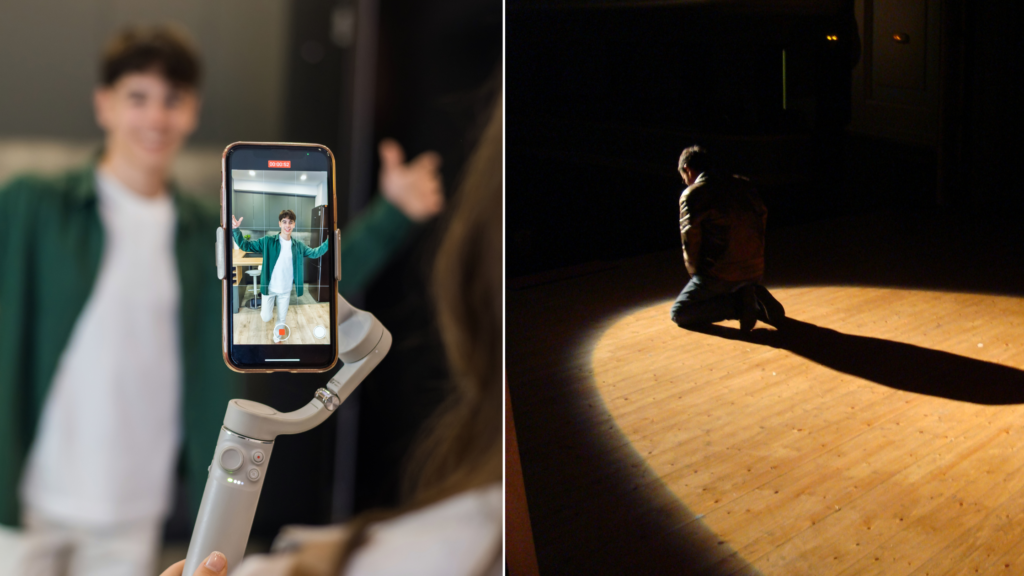“You’ll be the fat guy in the sitcom… but you’ll never touch art.”
I don’t remember many things verbatim, especially when said over ten years ago. But I sure as shit remember this one.
Setting the stage
I graduated from the highly competitive acting Program at DePaul University, where each year 1-2% of applicants get accepted (through multiple auditions).
But simply getting in wasn’t good enough. The first year was a trial to determine who would be invited back to complete the acting program.
Only the most talented and hardworking actors, decided by the tenured professors, would make “the cut.” If I remember correctly, twenty-eight out of the original forty-two students per class were invited back. (They stopped the cut system two years after my first year).
I made the cut, but that was only the beginning of my acting conservatory ass-beating.
We began our second year with “Introduction to Performance” – small-scale “beta” shows before our upperclassmen years in the main casting pool.
Traditionally, student-directors from the MFA program directed these performances, but given that our year was causing a buzz for being “especially talented” (I still name-drop Joe Keery as one of my 27 classmates, like a loser), we were given professors as directors.
And boy, did I “luck” out.
My show was assigned the Destroyer of Actors – Jane Brody.
Fuck.
Her lore permeated the halls of our school. She was known to absolutely cross-check wannabe actors’ egos into the boards. Destroyed them. A Scorched Earth type director out of a Broadway farce who yells “CUT” or “STOP” mid-scene during a live performance.
Which is exactly what happened to me.
The Reason
Given my weight and acting style I was already being cast as the comedic best friend to the leading man type. You know, the one who never has a romantic scene. So I was given the comedic role of Andre in the obscure play, Five Flights by Adam Bock.
Up until that point, I always hid my weight behind a funny mask, which is what I tried to do during this production.
Bad move.
It may have worked for me in high school or some other bullshit acting program, but not a globally ranked acting conservatory.
So I was up there. Changing my shirt in the locker room scene – how bitterly ironic. I can’t remember exactly what sparked it, but… I’m up there. Being all insecure with my shirt off trying to make the scene funny in front of the attractive females in my class watching from the wings.
Which is what you would think a comedic actor should do, right? Try to be funny.
No. It’s not what the fuck they do. At least not the good ones. And that’s what I learned on this day.
The Hammer
Jane was primed to rock me. And so it happened.
My worst fear, and in the worst way. She laid down the hammer on my performance during a dress rehearsal with a partial audience.
In retrospect, I knew it was a microcosm of her larger tactic to make the newly uncut actors feel like they should have been cut. Kept us motivated and not ungrateful for our positions.
“STAHHHP. STAHHP. STAHP THE FUCKING SHOW. STAHP.”
Jane shouted.
(Silence for a full five seconds)
“Dahn… Dahn….. Dahn…….”
(Pushing up her glasses with a “Now it’s YOUR turn to get destroyed” smile).
“You’ll be the fat guy in the sitcom… but you’ll never touch art.”
Everyone in the room: my fellow classmates/castmates not knowing if they should look at me or look away. Shock. My face a solar flare. 😳 on most people’s faces, if I do recall.
Oh. My. God.
It actually happened (maybe our thoughts and fears can create reality, after all). Probably one of the harshest roasts she gave in a while… if ever.
Had it been post-2016, she’d be on administrative leave if I decided it made me feel “unsafe” and “fat-shamed” (it wouldn’t have).
The lesson
“Does that mean I’m good?”
“Am I like a Kevin James type?”
“But is this necessarily a bad thing? Sitcoms make money.”
“I think I know what she means to ‘show and not tell’ but how do I do that??”
This was the lesson Jane tried to instill in me:
Show, don’t tell. And if you know, it will show.
It swirled in my head the next twenty-four hours, and so many thoughts plagued me on my bike ride home that evening.
You know how I know it was a defining moment? I can still remember the irrelevant details. My bike tires tracing smooth patterns on the pavement during the season’s first snow. Lost in concern and doubt as I biked at half the speed through Old Town in a soft-focus daze before crossing North Ave.
But I finally concluded the only solution was to let go… and somehow “know.”
My acting improved two-fold.
It was our next and final dress rehearsal. My last chance to fix whatever I couldn’t fully grasp about “trying” to be funny. So, I did something completely counterintuitive – something I had never felt comfortable doing.
I made comedy serious.
Here’s what I mean: Superb acting is not a popularity contest. It should NEVER involve the actor playing to the audience (or the camera, which is a delayed audience). We act from the character’s point of view, and the character is never trying to be funny throughout the entire script.
Sure, there are moments when the character might try to be funny. But as the actor, it’s your responsibility to tie everything the character does to their deeper throughline of desires, fears, and dreams.
Your character always pleads their case to get what they want, which is ALWAYS about fulfilling their dream or controlling their reality, just like in real life.
So… never, ever, ever play to the audience to be funny (sitcom).
Instead, play to the truth of the character and their circumstances. That’s it.
As with so many things in life, this approach is counterintuitive. Doing it as an actor requires intense focus and commitment to every scene.
Let’s break it down a bit more.
By “I made my comedic acting serious,” I mean I chose to “know” the actor (not character) – to fill myself with real emotional life. We call this “personalization.” Personalization is achieved by applying the circumstances of the play, movie, TV show, or script to analogous or potential circumstances from one’s life grounded in personal facts.
This touches on the Meisner technique, but I’ll save a deeper dive for another post. Whether it’s Stanislavski, Meisner, or any other method, it all boils down to the same core principle: Acting requires emotional truth. No amount of fakeness can substitute for it.
You must deeply relate to your character’s point of view on an empathetic level. Then… you will know.
From there, the text simply “floats on top.” The truth will simply “show” itself.
This is where extraordinary acting happens and goes beyond “good” acting – which, frankly, isn’t that hard for most people to act well.
You’ll understand this distinction when you watch a scene and think, “Holy shit, that movie was… wow,” versus, “Yeah, the movie was good.”
Even when I narrate audiobooks, I’m always working to personalize it to make it extraordinary. Not just ordinary, which is what many just ok audiobook narrators do. They make it sound good that I call the narrator “golden voice.” But they fail to make it a truly emotionally moving work.
Here are some examples of “serious” comedic acting that are my personal favorites for their hilarity (Ben Stiller is a master of his craft):
- Ben Stiller in Heavyweights
- Ben Stiller in Dodgeball (rumored to be the same character)
- Justin Long in Sasquatch Gang (Joey Kern is also hilarious as ‘Shirts’)
- John C. Reilly in Step Brothers (Went to DePaul’s Acting program as well)
Different from a sitcom because they’re not waiting for a laugh track after delivering a line. They are committing 100% to the seriousness of their characters’ POV.
Opening Day Micro-Fame
I “applied” this, and the sudden change blew away Jane. She said I was an instantly transformed actor. At first, I thought she might’ve felt bad about what she’d said the previous day and was bullshitting me – but no.
It was Jane Brody. No punches. No BS.
And my classmates agreed. I was WAY better (and funnier).
The adjustment felt strange, like when you first learn to ride a bike sans training wheels. I wasn’t actively trying to be funny, but passively, by knowing. And it worked.
Opening day came, and the show had to stop because of the laughter my scenes caused. No joke.
There was one particular scene where Andre suddenly interrupts his closeted gay teammate (the lead) and his lover’s date, asking if they finally kissed. He says no, and Andre’s one line of disappointment was simply: “Oh.” To then exit stage right while eating a Rice Krispie treat.
I committed to Andre being upset that his teammate and friend wasn’t “going for it.” I delivered the line in seriousness as the character, but with full awareness of the comedy as the actor.
The way I delivered the “OH.” was inexplicable. But one thing I do know: I was committed to the scene. I wanted my best friend to feel comfortable in his own skin.
That was my truth. And I was frustrated he wasn’t stepping up.
With that driving my know, the comedy floated on top, and it worked. Stakes: Raise the stakes. Take the scene seriously from the character’s point of view, and boom—you’re done.
The upperclassman approval I so craved came in spades. (Funny types need everyone’s approval.) Word spread and we were PACKED for the rest of the show’s run.
Everyone wanted to see this hilarious Dan Lewis guy.
The Sitcoms of 2025
Fast forward to now – ten years later – and sitcoms have morphed into influencers.
Ever scrolled through social media and stumbled on a “funny” video with millions of views, only to think, “How the fuck do people find this cringe brainrot actually funny?”
Here’s the thing: these “influencers” will struggle to maintain their views over time. But the truly extraordinary ones – the ones who connect to humanity and truth – will endure.
Why?
Because they tap into something deeper by avoiding the trap of doing the same tired schtick over and over (even though the algorithm rewards schticks – yet another reason why humanity is completely cooked).
And sure, not all influencers are actors, but you know what I mean. The ones who commit to creating with genuine intention rather than just chasing likes are the ones who will go further.
My Personal Conflict
I am torn between playing the social media game and simply posting real art and comedy on this website. Because I, too, have become a victim of the algorithm that rewards views for the dumbest things.
I need to play the game – but always try to morph it into something meaningful. Actual art. Comedy with a character who’s being serious.
Otherwise, I’d be a massive hypocrite.
We’ll see.
Now it’s your turn to stop trying.
If you’re an actor or an acting hopeful, you can learn to elevate your craft—even if it’s just for social media.
What would it look like to commit to the truth of the scene instead of pandering to your audience? To stop chasing fame for fame’s sake?
In other words, to actually display skill and talent?
The natural response is, “Yeah, I know. I already do that.” To which my now-hardass Jane Brody response is: shut up. That’s your ego talking.
Commit to the truth. The truth that lives in you. And forget the rest.
Wanna hear me perform my monologue from Five Flights in the World’s “First” Blogcast?
I’m trying something new with my blogs… I will read them as audio, where sometimes I’ll go off script and riff. Hope you like it:
TL;DR:
Take your character’s point of view seriously. Never play to the audience. Stifle your actor ego. Focus. Raise the stakes. Play actions on your partner. And boom – real comedy can come from this.




